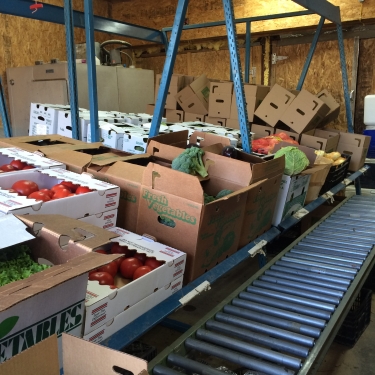Connecting Farmers to Eaters – and Businesses – in Maine
When Sarah Smith and Amber Lambke launched the Pickup, a local food grocery delivery and wholesale distribution business in Skowhegan, Maine, it looked a little different than it does today.
It began in fall 2011 with a multi-farm CSA, which stands for community supported agriculture, a popular way for consumers to buy local, seasonal food directly from area farmers. A year later, they took advantage of their unique space—a renovated county jail in a revitalizing downtown Skowhegan—and added a weekend café. All the while, though, interest from wholesale customers was growing. The Pickup soon found itself with the means and demand to address the oft-overlooked middle of the local-food movement: distribution.

“A lot of businesses want to buy from local growers, but they don’t want 20 farmers showing up at their door,” said Smith, who now co-owns the business with Ann Mefferd. The Pickup could provide a win-win solution: growers could be paid right away, and buyers could get a one-stop shop for Maine-grown products. Or as stated on The Pickup’s website, “We’re basically the coolest middle man around.”
.jpg)
Thus, when the Pickup participated in Fair Food Network’s first Business Boot Camp in 2013, it was a CSA, café, and wholesale distributor—a lot of hats for a small business to wear. An annual event sponsored by the Network’s Fair Food Fund project, this three-day intensive training workshop culminates in a pitch competition, which the Pickup won, earning $10,000 in Consulting Corps business assistance from the Fund. Smith and her team put the money toward the café, hiring a restaurant consultant and marketing specialist.
They connected with the Fund a year later for additional Consulting Corps support. This time, Smith connected with financial consultant Scott Budde. Budde helped the Pickup examine its margins and see the growth potential for each part of the business. The café, it turned out, didn’t have much.
“We knew the café was struggling, and it really came to light talking to those professionals and experts,” Smith said. She saw that, while the CSA and the wholesale operation fit well together, the café was essentially just another wholesale customer.
“The work we did at the boot camp was critical for me in managing the whole thing,” Smith said. “Scott came to the same conclusion that I was giving the board as a manager.”

Through the Consulting Corps project, Sarah and her team also worked with June Sleeper, a business consultant who helped them refine their distribution processes. Sleeper brought broad business background and expertise in logistics and supply chains from years working with outfits such as Sappi North America, a paper company. She helped the Pickup understand that, while it’s a company on a mission to bring people good, healthy, local food and to do right by local growers, it’s still ultimately a distributor. As such, it needed a handle on its delivery costs. Sleeper developed a data-capturing tool that helped the team break down each run, driver, and truck into costs and sales per mile. Now Sleeper has adapted the tool developed for the Pickup to help other companies, and the Pickup is exploring new growth avenues, such as increasing sales on profitable routes.
“That work has opened doors we didn’t even realize,” Smith said. Since working with Sleeper, the Pickup added seven new vendors. It now purchases from 67 food and farm businesses, a 21 percent increase.
Now, Smith and her team are ready to capitalize on all their hard work (which included shifting operations from the old jail to a warehouse on Smith’s farm): Smith is talking about doing a strategic plan to help the Pickup grow while maintaining its core values, which include helping Maine farmers grow a viable agricultural economy and giving its all residents convenient, affordable access to sustainably grown, local food.
“The next step is to put those puzzle pieces together: ‘Here’s the goal, here’s how we’re going to get there.’”
Courtney Balestier is a James Beard-nominated writer based in Detroit.
Federal funding for Fair Food Fund Consulting Corps work was provided by Local Food Promotion Program of the Agricultural Marketing Service, U.S. Department of Agriculture.







